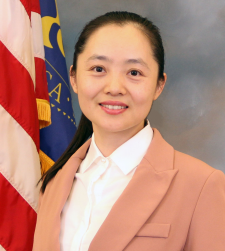Ting Li Ph.D.
Bioinformatician — Division of Bioinformatics and Biostatistics
Ting Li, Ph.D.
(870) 543-7121
NCTRResearch@fda.hhs.gov
Back to NCTR Principal Investigators page
Background
Dr. Ting Li received a Ph.D. in bioinformatics from the joint program at the University of Arkansas at Little Rock and the University of Arkansas for Medical Sciences. She then joined the Division of Bioinformatics and Biostatistics (DBB) at FDA’s National Center for Toxicological Research (NCTR) as an Oak Ridge Institute for Science and Education fellow. She was then converted to a visiting scientist with DBB. Throughout her career, Dr. Li has authored or co-authored more than 10 peer-reviewed publications and presented at nearly 20 academic conferences. In 2022, she was honored with the 1st-place award in the Environmental Mutagenesis and Genomics Society's Bioinformatics Challenge.
Research Interests
Dr. Li’s research interests focus on developing and applying advanced artificial intelligence (AI) methodologies for drug safety research and the extension of their potential application in the FDA review process. This research includes:
- Developing quantitative structure-activity relationships (QSARs) models using advanced AI methodologies for various safety endpoints important to the FDA, such as drug-induced liver injury (DILI), carcinogenicity, and mutagenicity
- Developing AI and machine learning models using genomic data to predict toxicological endpoints
- Developing generative adversarial networks methods to translate genomic profiles from one organ to another
Professional Societies/National and International Groups
American Association of Pharmaceutical Scientists
Member
2020 – Present
Massive Analysis and Quality Control Society
Member
2022 – Present
MidSouth Computational Biology and Bioinformatics Society
Member
2019 – Present
Selected Publications
TransOrGAN: An Artificial Intelligence Mapping of Rat Transcriptomic Profiles between Organs, Ages, and Sexes.
Li T., Roberts R., Liu Z., and Tong W.
Chem Res Toxicol. 2023, 36(6):916-925.
DeepAmes: A Deep Learning-Powered Ames Test Predictive Model with Potential for Regulatory Application.
Li T., Liu Z., Thakkar S., Roberts R., and Tong W.
Regul Toxicol Pharmacol. 2023, 144:105486.
Best Practice and Reproducible Science are Required to Advance Artificial Intelligence in Real-World Applications.
Liu Z., Li T., Connor S., Thakkar S., Roberts R., and Tong W.
Briefings in Bioinformatics. 2022, 23(4):bbac237.
Adaptability of AI for Safety Evaluation in Regulatory Science: A Case Study of Drug-Induced Liver Injury.
Connor S., Li T., Roberts R., Thakkar S., Liu Z., and Tong W.
Frontiers in Artificial Intelligence. 2022, 5:1034631.
DeepCarc: Deep Learning-Powered Carcinogenicity Prediction Using Model-Level Representation.
Li T., Tong W., Roberts R., Liu Z., and Thakkar S.
Frontiers in Artificial Intelligence. 2021, 4:757780.
Dice: A Drug Indication Classification and Encyclopedia for AI-Based Indication Extraction.
Bhatt A., Roberts R., Chen X., Li T., Connor S., Hatim Q., Mikailov M., Tong W., and Liu Z.
Frontiers in Artificial Intelligence. 2021, 4:711467.
Correlations Between Sleep Disturbance and Brain Cortical Morphometry in Healthy Children.
Na X., Li T., Larson-Prior L.J., Baldwin C.E., Badger T.M., and Ou X.
Sleep Science and Practice. 2021, 5:1-8.
Drug-Induced Liver Injury Severity and Toxicity (DILIst): Binary Classification of 1279 Drugs by Human Hepatotoxicity.
Thakkar S., Li T., Liu Z., Wu L., Roberts R., and Tong W.
Drug Discovery Today. 2020, 25(1):201-8.
DeepDILI: Deep Learning-Powered Drug-Induced Liver Injury Prediction Using Model-Level Representation.
Li T., Tong W., Roberts R., Liu Z., and Thakkar S.
Chemical Research in Toxicology. 2020, 34(2):550-65.
Deep Learning on High-Throughput Transcriptomics to Predict Drug-Induced Liver Injury.
Li T., Tong W., Roberts R., Liu Z., and Thakkar S.
Frontiers in Bioengineering and Biotechnology. 2020, 8:562677.
Cortical Morphometry is Associated with Neuropsychological Function in Healthy 8‐Year‐Old Children.
Li T., McCorkle G.S., Williams D.K., Badger T.M., and Ou X.
Journal of Neuroimaging. 2020, 30(6):833-42.
Brain Cortical Structure and Executive Function in Children May Be Influenced by Parental Choices of Infant Diets.
Li T., Badger T.M., Bellando B.J., Sorensen S.T., Lou X., and Ou X.
American Journal of Neuroradiology. 2020, 41(7):1302-8.
Scoring Matrix Combined with Machine Learning for Heterogeneously Structured Entity Resolution.
Li X., Talburt J.R., Li T., and Liu X.
Journal of Computing Sciences in Colleges. 2019, 34(7):38-45.
Scoring Matrix for Unstandardized Data in Entity Resolution.
Li X., Talburt J.R., and Li T.
2018 International Conference on Computational Science and Computational Intelligence (CSCI). 2018, 1087-1092. IEEE.
- Contact Information
- Ting Li
- (870) 543-7121
- Expertise
-
ExpertiseApproachDomainTechnology & DisciplineToxicology


